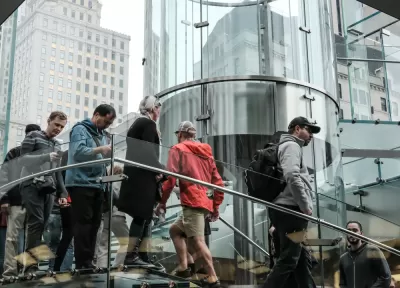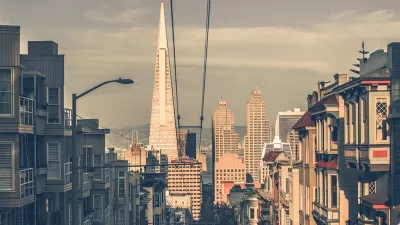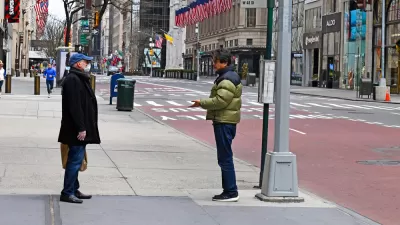Cities around the world are employing vastly different strategies in the effort to get workers back in the office.

Mobility data compiled by Google shows a sharp international divergence in how workers in major financial centers are returning to the office, according to an article by Emily Cadman, Stephan Kahl, Charlotte Ryan, Faris Mokhtar, Nic Querolo, Sarah Holder, Natalie Wong, Steven Arons, Hayley Warren and Sam Dodge. While cities like New York and London have started rebounding, "Singapore and Sydney have had to introduce fresh restrictions as the number of coronavirus cases spikes."
The authors attribute the difference to "vaccination rates and countries’ varying risk appetites." London, New York, and Frankfurt have begun to reopen after vaccines became available, while "cities such as Singapore and Sydney that locked down hard and early—and so got people accustomed to very low levels of infection and risk—have found loosening restrictions tougher as they face further outbreaks."
This hasn't always been the case: by June, Sydney's "[o]ffice occupancy rates had risen to more than 65% of pre-pandemic norms and the state government was poised to launch a voucher program to encourage people back to the city center to eat and drink." But after a massive outbreak of the Delta variant and a months-long lockdown, "the heart of the city is empty." Meanwhile, around 28 percent of the New York region's office workers have returned to work in person and schools fully reopened in September. The article details the trajectory of several other global cities including San Francisco and Frankfurt.
While many cities are experiencing gradual reopenings, "the return to normalcy is still a ways off."
FULL STORY: The March Back to Office Heads in Sharply Different Directions

Maui's Vacation Rental Debate Turns Ugly
Verbal attacks, misinformation campaigns and fistfights plague a high-stakes debate to convert thousands of vacation rentals into long-term housing.

Planetizen Federal Action Tracker
A weekly monitor of how Trump’s orders and actions are impacting planners and planning in America.

In Urban Planning, AI Prompting Could be the New Design Thinking
Creativity has long been key to great urban design. What if we see AI as our new creative partner?

Baker Creek Pavilion: Blending Nature and Architecture in Knoxville
Knoxville’s urban wilderness planning initiative unveils the "Baker Creek Pavilion" to increase the city's access to green spaces.

Pedestrian Deaths Drop, Remain Twice as High as in 2009
Fatalities declined by 4 percent in 2024, but the U.S. is still nowhere close to ‘Vision Zero.’

King County Supportive Housing Program Offers Hope for Unhoused Residents
The county is taking a ‘Housing First’ approach that prioritizes getting people into housing, then offering wraparound supportive services.
Urban Design for Planners 1: Software Tools
This six-course series explores essential urban design concepts using open source software and equips planners with the tools they need to participate fully in the urban design process.
Planning for Universal Design
Learn the tools for implementing Universal Design in planning regulations.
planning NEXT
Appalachian Highlands Housing Partners
Mpact (founded as Rail~Volution)
City of Camden Redevelopment Agency
City of Astoria
City of Portland
City of Laramie





























